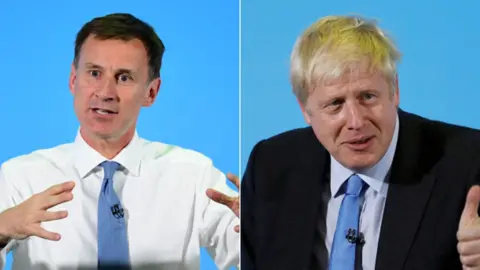Tory leadership: Hunt and Johnson's backstop remarks 'significant'
 Getty images/Reuters
Getty images/ReutersThe leadership candidates' hardening of position on the controversial Irish backstop is "significant", ex-attorney general Dominic Grieve says.
The views of Jeremy Hunt and Boris Johnson expressed at a debate seem to rule out any compromise, the MP added.
They both declared the backstop "dead" and rejected the idea of a time limit, which the BBC's Norman Smith said was a "huge heave" towards no deal.
But Mr Grieve warned that a government seeking no deal would collapse.
The Remain-supporting MP said he believed more Conservative colleagues, including current front benchers, would join him in attempts to prevent the UK leaving on 31 October without a deal.
Work and Pensions Secretary Amber Rudd said she was "surprised" by the contenders' comments on the backstop, but believed they would "find they have to compromise".
The cabinet minister, who has been convinced by her preferred candidate Mr Hunt that no-deal should remain on the table, told Politico: "I think their views will collide with the reality when, whichever one wins, starts negotiating and starts dealing with a Parliament which may be more difficult than they think to engage with."
No 'escape hatches'
The backstop, included in the withdrawal agreement negotiated by Prime Minister Theresa May and the EU, is designed as an insurance policy to prevent a hard border on the island of Ireland after Brexit.
But this deal was rejected three times by MPs in the Commons, with the backstop a key sticking point.
Critics fear it would be used to permanently trap the UK in the EU customs union, preventing the country from striking its own trade deals.
Other MPs have said the backstop would only be acceptable if it had a strict time limit, or if the UK had a unilateral right to end the arrangement.
The EU has repeatedly said it will not renegotiate the withdrawal agreement and insisted the backstop must be part of any deal agreed.
Ursula Von der Leyen - who MEPs have elected to be the next European Commission president - told MEPs on Tuesday: "The Withdrawal Agreement provides certainty where Brexit created uncertainty, preserving the rights of citizens and in preserving peace and stability on the island of Ireland."
To groans from Brexit Party MEPs in the chamber, she added, "However, I stand ready for further extension of the withdrawal date should more time be required for a good reason."
At a head-to-head leadership debate run by the Sun on Monday, Mr Johnson said he would not be seeking a time limit to the backstop, insisting: "It needs to come out."
He said the UK must say "no to time limits or unilateral escape hatches or all those kind of elaborate devices, glosses, codicils and so on that you could apply to the backstop".
Mr Hunt also said the backstop was "dead" and rejected the idea of a time limit.
"The backstop, as it is, is dead, so I agree with Boris - I don't think tweaking it with a time limit will do the trick, we've got to find a new way," he said.
"But the thing that mustn't die... is a cast-iron commitment to the Republic of Ireland that we will not have border infrastructure."

Analysis
By Norman Smith, BBC assistant political editor
Boris Johnson and Jeremy Hunt have given the UK another almighty heave in the direction of no deal. By ruling out any reworking of the backstop, they have closed off what some regarded as the best route to securing a Brexit deal.
Even some leading Brexiteers had mooted the idea of trying to secure an end date for the backstop. A compromise, they argued, which it might have been possible to sell to Parliament. And which the EU - having already said the backstop would be temporary - might have been prepared to concede.
Now, however, Mr Hunt and Mr Johnson have declared the backstop "dead". It means that whoever becomes PM will have to try and construct an entirely new Brexit deal in just three months. It also pre-supposes the EU will be willing to negotiate a fresh deal.
Of course, it's possible this is all bluff, designed to force the EU to blink. If they don't, however, then it's hard to see a likely alternative to no deal.

Speaking to BBC Radio 4's Today programme, pro-EU Tory MP and People's Vote campaign co-chairman Mr Grieve said: "I think it is significant because I have in the past heard it suggested… that there might be some possibility of compromise by the backstop being tweaked and on the face of it, it entirely rules it out."
He said blocking no deal "might be quite difficult" on a technical level - meaning that bringing down the government could be the only option in a confidence vote.
"If a government persists in trying to carry out a no-deal Brexit, I think that administration is going to fall," he said.
"By the end of next week there are going to be more Conservatives who have indicated very clearly that no-deal is unacceptable and I notice that many of them will no longer be on the front bench."
Meanwhile, Mr Grieve and Labour former foreign secretary Dame Margaret Beckett have launched a report that argues a series of possible Brexit outcomes will probably lead to further political deadlock, including renegotiating the backstop.
The report from the People's Vote campaign says that another referendum is the "most popular way of resolving the Brexit crisis" and the "only legitimate and democratic solution available".
The result of the contest to succeed Theresa May as prime minister will be announced on 23 July, with the winner taking office a day later.
Some 160,000 Conservative Party members are voting in a postal ballot to elect the next leader.

